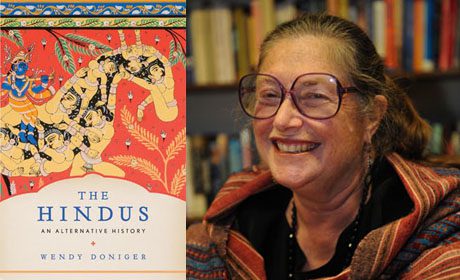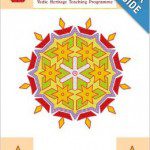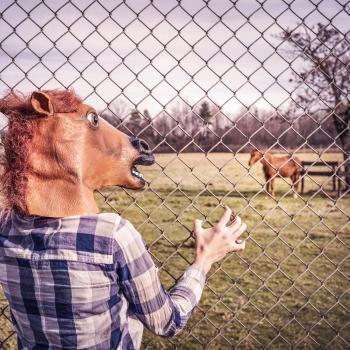I have not read The Hindus. I had not heard of Wendy Doniger before this controversy came up. There’s a lot of opinions, a lot of thoughts.I, as usually, am not sure what I think about all this. In an effort to try to get as much information as possible, I have been reading articles from a wide variety of viewpoints.
If you’d like to do the same, here is a roundup of a whole lot of articles I found on the subject from many different points of view.
I recommend reading through all of these and reserving opinion and thought until you’ve read a lot of them and keep an open mind to potentially good points from people you don’t in general agree with. I know, there are a lot of them!
For those as in the dark as I was, the controversy is that a Sanskrit scholar who is a white, American, Jewish woman has written a book called “The Hindus” and apparently offers some radically different interpretations of Hindu scriptures and texts, which seem to be based a lot on sex and Freud. Her methods and knowledge have been called into question and Hindu groups have succeeded in having the book withdrawn from publication in India. On the one hand, censorship is a dangerous thing and on the other hand, someone as privileged as Doniger making declarations about Hinduism could be taken as fact by non-Hindus and her views could become standard instead of the views of people who are actually Hindu. Are we shutting down potentially valid and expansive ways of seeing our scriptures or are we protecting a legacy from outsiders? A tough question. (yeah. i know. some people would classify me as an outsider as well).

Books, Lies and Videotape: Wendy Doniger’s Misrepresentations about Hindu History
by Padma Kuppa
I am a big fan of public funding for various things – public education, public television, and public radio. And I am usually impressed with the way National Public Radio ((NPR) presents news, providing a multifaceted and balanced perspective on the news – the underlying dharma or justice of presenting more than one perspective is very much in line with the pluralism that is inherent in the way that I live my day to day life. No one way is necessarily “The Right Way.” Yet I was horrified to find that NPR did the exact opposite when interviewing University of Chicago professor Wendy Doniger about her controversial book.
The Scholars: An Alternative Story About Wendy Doniger and The Hindus
by Vamsee Juluri
Imagine this: A book called The Women, written by a man who claims to be an expert on women. A book called The Poor, written by a millionaire who read a few books on poverty (written mostly by other rich people). A book called The Gays, written by a heterosexual who insists he loves them even if his subjects say he is quite homophobic. Now consider a book called The Hindus. It is written not by someone who grew up as a Hindu, in a Hindu household, or presumably, anything like a living Hindu cultural environment. It contains factual errors, as well as numerous arguably dubious interpretations. It appears to Hindu readers to be skewed, distorted, and even bizarre; even if one generously concedes that it is after all subtitled as an “alternative” history.
Hindu fundamentalists vs. Hinduism
by Stephen Prothero
After the egging, the pulping. In London in 2003, a protester threw an egg at University of Chicago Sanskrit scholar Wendy Doniger, who was lecturing on the popular Hindu epic the Ramayana. The egg missed its mark, but during the Q&A other protesters continued the assault, insisting that non-Hindus like Doniger had no right to tell them what Hinduism is all about. This month, Penguin Books India agreed to withdraw Doniger’s The Hindus: An Alternative History from Indian bookstores and pulp any remaining copies. The settlement came in response to a complaint filed by Dinanath Batra, head of Shiksha Bachao Andolan, a Hindu fundamentalist group that opposes sex education in Indian schools and textbooks that deviate from its Hinduvta(“Hinduness”) interpretation of Indian history.
‘When Westerners make fun of our gods, they’re instigating trouble’
Rajiv Malhotra’s interview on the issue of Wendy Doniger’s book ‘The Hindus’
by Arthur J Pais
‘In theory, yes, Hindus are very open. I’m one of them. I’ve coined the phrase ‘open architecture’.’ ‘But I think the Wendy Doniger group is not allowing open architecture. They are closing this architecture.’ ‘They are bringing a point of view in such a heavy-handed way that it tends to dominate and it tends to suppress the alternative points of view. So some kind of counteraction is necessary and using the law is a decent thing to do.’ Rajiv Malhotra, one of Wendy Doniger’s most vociferous critics, speaks to Rediff.com’s Arthur J Pais about the prejudices created by American scholars about Hindu gods and Hinduism.
Untangling the Knot
by JAKOB DE ROOVER
The many strands entangled in l’ affaire Doniger involve issues that are too important to be left to the predictable and somewhat stale rhetoric about Hindutva fanatics or lamenting the role of the Indian government and judiciary
A LETTER TO PENGUIN INDIA
‘Tell Us, Please, What Is It That Scared You So?’
By ARUNDHATI ROY
‘Even though there was no fatwa, no ban, not even a court order, you have not only caved in, you have humiliated yourself abjectly before a fly-by-night outfit by signing settlement.’
Of Sex, Sleaze, Sanskrit and Spin … Of Diversity Within Hinduism … Of “A Truth” and “The Truth”
by Shumon Sengupta
Vehemently denouncing the ban / withdrawal of Wendy Doniger’s book “The Hindus, an Alternate History,” Shumon Sengupta observes that in general, Hinduism, more than any other religion, has been a “lightning rod” for attention by curious western scholars with a queer and perverse penchant for eroticizing everything that has to do with this religion and culture. Nevertheless, Doniger’s narrative of Hinduism is rich, bold and vivid, particularly the way she picks up hidden voices within the larger stories, invests them with her own voice, retells their stories as seen through her own eyes, always in her own inimitable way. At the same time, despite the richness and sweep of her work, despite her vast erudition, when Doniger comments on Hinduism constrained by the flaws of her chosen analytical framework, she often risks becoming one among the proverbial six blind men trying to describe an elephant by touching a part of the behemoth. But then, ultimately, Doniger’s views are her truths, not necessarily ‘The Truth.’ Her books should never stand alone in that respect, but should be studied along those which portray other perspectives.
The Embarrassed Modern Hindu (Upper Caste Man)
by Nivedita Menon
…This is precisely the problem. Whether sophisticated scholars like Balgangadhar and De Roover, trying to make Hinduism look good in the West; or ordinary upper caste men like Dinanath Batra, feeling the existential anxiety produced by tides of unruly women, lower castes, and multiple and heterogeneous practices that call themselves Hindu, the real problem with Doniger is precisely that she highlights the fact that other subject positions than that that of the beleaguered upper caste, upper class man have always laid claim to Hinduism.
Statement by Scholars in North American Universities on Withdrawal of Wendy Doniger’s book
by Aditya Nigam
We, the undersigned, as students of South Asia, strongly condemn the withdrawal by Penguin Press India of Wendy Doniger’s The Hindus: An Alternative History from distribution in India. We believe that this work has been attacked because it presents a threat to orthodox Brahminical interpretations of Hinduism. We believe that this attack is part of ongoing attempts by upper-caste extremist Hindu forces to stifle any alternative understandings of Hinduism.
Mani-Talk: Wendy Doniger and Salman Rushdie, separate and not equal
by Mani Shankar Aiyar
After reading the massive, 779-page tome with fascinated interest, my daughter presented me with a copy of Prof. Wendy Doniger’s The Hindus: An Alternative History. It is hardly likely that a daughter would present her father with a work of pornography. Moreover, unlike her father, she is spiritually inclined. She felt she had learned a great deal that her father needed to learn. She is also a highly trained lawyer, with a BA Honours in Jurisprudence from Oxford (where she was a Radhakrishnan scholar) and an LL.M. from New York University, besides long experience in a leading law firm of the country. Hence, the Indian Penal Code is not unknown to her. She would be loath to present her father with a book that broke the law. I confess I have been looking for an opportunity out of my more mundane distractions to settle down to absorbing the wisdom my daughter wants me to have. Meanwhile, comes an out-of-court settlement with the publishers deciding to pulp the unsold copies. As one who continues to support Prime Minister Rajiv Gandhi’s mid-80s decision to ban the import of Salman Rushdie’s Satanic Verses, how do I reconcile my horror at what is being done to Wendy Doniger with my solidarity with Rajiv on Satanic Verses?
Right or wrong, Wendy Doniger’s ‘The Hindus’ should be published
by SWATI SHARMA
…The case has caused outrage in India, and, as a result of Penguin’s actions, the book has become a hot seller on Amazon. Countless media organizations and well-known writers have reported and weighed in on the issue.
The group that filed the lawsuit said it was because it “hurt the feelings of Hindus.” More specifically, the connections between sex and religion, misinterpretations of the sacred text and factual inaccuracies are the main concerns about “The Hindus.”
Wendy Doniger’s Book
by Dr. Shyamalavatsa
Much has been said about Wendy Doniger’s book in the media. To be fair, the author has admitted on the front coverthat it is an alternative history, not the one that most Hindus believe in. I’ve just been wondering – if I were to spend years studying a religion practiced in a different country and get a doctorate in it, what sort of book would I write?
Doniger debate symbolizes turbulence in the air
by Swapan Dasgupta
…What seems to unite the Left outrage I witnessed 30 years ago and Batra’s litigation is the shared sense of intellectual dispossession. The free flow of ideas in a democracy is invariably tempered by value judgments over what is ‘respectable’ and what is not. Those who rubbish Doniger feel, and quite legitimately so, that academia disregards those who analyze faith from the perspective of believers. They believe that studies of Hindu faiths have been taken over, particularly in the US, by those who inherently are sceptical of the larger Indian inheritance. This conviction is bolstered by the apparent arrogance of dominant intellectuals who refuse to concede space to those who have a more sympathetic perspective of Hindu theology.
Beyond Batra and Doniger: Reflections on the study of Hinduism in the American academy
by SANYASI
…I was also, at the time, a member of the South Asian Journalist Association (SAJA) discussion forum, where, despite the best efforts of the long-suffering moderators, any number of discussions would quickly degenerate into arguments about the supposed denigration of Hinduism by secularists, Macaulayites, Western academics, and so on. It was here that I learned of the “intellectual Kshatriyas,” a self-styled vanguard of Hindus out to defend Hinduism from its detractors in the American academy and elsewhere. Most of their arguments were of very poor intellectual quality, diatribes sprinkled with the odd term like “symbolic capital” drawn from social theory or postcolonial theory. Then, as now, the actions of the Hindu Right were outrageous: attacks on freedom of expression and cowardly acts of bullying and intimidation against an individual. And, then, as now, the possible range of responses to the events was reduced to a set of two choices: a good Hindu / bad Hindu (or good Indian / bad Indian or good South Asian / bad South Asian) polarity, in which as a right-thinking Hindu / Indian / or South Asianist in the academy one had to speak up against the Hindu Right or risk being seeing as an apologist for them. This state of affairs foreclosed the possibility then, as it does now, of a genuine, much-needed, and long overdue debate about the politics of the representation of Hinduism in the American academy.
Sex, Lies and Hinduism: Why A Hindu Activist Targeted Wendy Doniger’s Book
By Nilanjana Bhowmick
In a conversation with TIME, Shiksha Bachao Andolan president Dinanath Batra explains why he thinks Doniger’s book hurts Hindu sentiments and is propagating lies about Hindu deities and national icons. No stranger to controversy, Batra had earlier taken on Indian educational boards for what he says have been distortion of facts and has actively opposed and subsequently stopped the introduction of sex education in Indian schools, saying it was against Hindu culture and religion.
Interviewing Wendy Doniger
by Dr. Devdutt Pattanaik
Anyone who is serious about studying Hinduism needs to study the works of Wendy Doniger (b.1940), who for over 40 years has been researching, translating, and commenting on Hindu scriptures and stories. Had it not been for her, I would not have had access to so many tales hidden in our scriptures. Her language is direct and simple, shorn of distracting ornamentation. But her interpretations and choice of words (like the insistence in using the word ‘evil’ even though no common Indian language has a synonym for it) though thought-provoking are not always satisfying. A distinguished professor at the Divinity School, Chicago, with a PhD from Harvard and DPhil from Oxford and with several honorary doctorates to her credit, her first book, published in 1978, was the Asceticism and Eroticism in the Mythology of Siva. This year sees the release of her latest book The Hindus: an Alternative History, which puts together the various influences – beyond the Sanskrit texts – that have shaped Hindu thought over thousands of years. Despite the usual male-bashing and Brahmin-bashing, this is without doubt a monumental work that is awe-inspiring and humbling in its scale.
The Hindus: An Alternative History by Prof. Wendy Doniger
A Chapter-wise Review
by Vishal Agarwal
Wendy Doniger’s book “The Hindus, an Alternative History,” published and distributed by Penguin has been a phenomenal sales success. Already (in February 2010), more than 600 libraries in North America have acquired a copy of the book, in less than one year since its publication. The Indian division of Penguin has brought out an Indian reprint as well. Doniger claims that her book is about Hindu women, low castes, dogs and horses. But these merely appear to be an excuse for her to indulge in bouts of lewd descriptions, imaginary rapes, violence, titillating sleaze, drugs, booze and the like – all of which is then superimposed on the Hindus and on their traditions. As usual, she kinks fairly straightforward narratives in Hindu scriptures to present her own pornographic versions. Medieval India is not her forte at all, and Doniger is often seen reproducing (and even amplifying) the errors already present in her secondary and tertiary sources. The book is more than 600 pages long, and the number of errors average more than 1 per page. There are errors of chronology, of historical dates and sequence of events, geography, verifiable historical facts, proper names, translations of Sanskrit texts and so on. These errors are compounded by strained and agenda driven interpretations that whitewash medieval atrocities on Indians, perpetuate colonial and racist stereotypes about Hindus, attribute many positive developments within the Hindu society to impulses from Christianity or Islam and grossly distort historical evidence.
10 Controversial Quotes from Wendy Doniger’s ‘The Hindus’
By Subhamoy Das
Wendy Doniger’s controversial book ‘The Hindus: An Alternative History’ (Penguin, 2009) has outraged Hindus around the world like never before for allegedly insulting and offending Hindus and Indians. Seventy-three-year old Doniger is an American Jewish Indologist and has been a professor at the University of Chicago since 1978. Although she is a well-known authority on Hinduism, her bestseller book has been pointed out to have many factual errors and her perspective of things Indian, Vedic, and Hindu has been questioned time and again. Here are 10 outrageous excerpts from the book that may explain the outspread uproar against the Doniger which ultimately led to a virtual ban of her book in India.
Author Resigned to Ill Fate of Book in India
By JOHN WILLIAMS
…In “The Hindus,” Ms. Doniger wanted “to tell a story of Hinduism that’s been suppressed and was increasingly hard to find in the media and textbooks,” she said. “It’s not about philosophy, it’s not about meditation, it’s about stories, about animals and untouchables and women. It’s the way that Hinduism has dealt with pluralism.”
The novelist Hari Kunzru said in an email interview that Ms. Doniger’s work “emphasizes that Hinduism has never existed as a single pure orthodoxy.” Instead, he said, Ms. Doniger shows how “it emerges from many linked traditions and folk practices.”
Wendy’s Child Syndrome
by Rajiv Malhotra
In my previous Sulekha column, I pointed out that whereas elite colleges in the West teach great respect for Greek and other Western Classics as being the bedrock of their civilization, it has become fashionable for elitist (i.e. Westernized) Indians to denigrate their own Indian Classics. Furthermore, these Indians see their education in Western literature as validating their Western identity (falsely equating modernization with Westernization), and go out of their way in putting down their Indian heritage.
Recommended in the comments & twitter:
Wendy Doniger’s book is a tribute to Hinduism’s complexity, not an insult
by Vijay Prashad
…Doniger, a professor of the history of religions at the University of Chicago, is no stranger to this kind of controversy. Her studies of Hinduism have sought to recover the buried, heterodox Tantric tradition from under the weight of the orientalist’s favourite form of Hinduism – Vedanta. For European orientalists, Vedantism was the closest to their own monotheism – a set of faith practices bourgeois in their mood and conduct. Tantrism – with its impurities of sex and diet – seemed out of favour. Doniger and her collaborators sought to revive interest in Tantrism, for which they turned to new methods of interpretation, notably psychoanalysis.
The Need for Indian Narrative
by Nithin Sridhar
1. The issue of withdrawal of Wendy Doniger’s book “The Hindu” and subsequent drama again shows the need for Hindu/Indian Narrative and Scholarship.
2. Those who are traditionally trained lack knowledge of modern scholarship. Further their numbers are dwindling fast.
3. The people with modern education largely has superficial understanding of Hindu religion and allied subjects.
4. We need to do two things- 1. Revive the traditional system of education of Veda, Vedanta, Tarka, Agama etc.And support the practitioners. 2. We need to create Indian narrative/analysis of not only Indic religions and traditions but also of world religions.
Wendy Doniger’s derogatory Hinduism studies
by Madan Lal Goel
I do not believe in burning books, but Wendy Doniger’s 779-page tome titled, The Hindus: An Alternative History, 2009, is a hurtful book. It is laced with personal editorials, folksy turn of the phrase and funky wordplays. She has a large repertoire of Hindu mythological stories. She often narrates the most damning story—Vedic, Puranic, folk, oral, vernacular—to demean, damage and disparage Hinduism. After building a caricature, she laments that fundamentalist Hindus (how many and how powerful are they?) are destroying the pluralistic, tolerant Hindu tradition. But, why save such a vile, violent religion, as painted by the eminent professor? There is a contradiction here.
Doniger’s book is at odds with the increasing acceptance in the United States of key Hindu spiritual precepts. Lisa Miller (Newsweek, 31 August, 2009) reports that Americans “are slowly becoming more like Hindus and less like traditional Christians in the ways we think about God, our selves, each other, and eternity.” Miller cites the following data:
- 67 percent of Americans believe that many religions, not only Christianity can lead to eternal life, reflecting pluralistic Hindu ethos rather than exclusivist Christian doctrine;
- 30 percent of Americans call themselves “spiritual, not religious;”
- 24 percent say they believe in reincarnation;
- And, more than a third choose Cremation rather than Burial. See: http://www.newsweek .com/id/212155
Oh, But You Do Get It Wrong!
by ADITI BANERJEE
Wendy Doniger (Mircea Eliade Distinguished Professor of the History of Religions in the Divinity School and in the Department of South Asian Languages and Civilizations at the University of Chicago) was recently interviewed in Outlook with reference to her new book, The Hindus: An Alternative History. In the interview, she (1) falsely and unfairly brands all of her critics as right-wing Hindutva fundamentalists, and (2) grossly mischaracterizes (and misquotes) the text of the Valmiki Ramayana, calling into question her “alternative” version not just of the Ramayana, but also of Hinduism and Hindu history as a whole.
Doniger’s prominence and clout as a “definitive” authority in the discourse on Indian traditions and history give her views considerable significance. For, it is Doniger’s (and her colleagues’) versions of Hinduism and Hindu history (which are often at serious variance with traditional Hinduism as practised and understood by Hindus themselves) that form the curriculum of university courses, line the bookshelves of the “Hinduism” sections of bookstores (physical and virtual), and are given play in the Western and Indian mainstream press.











